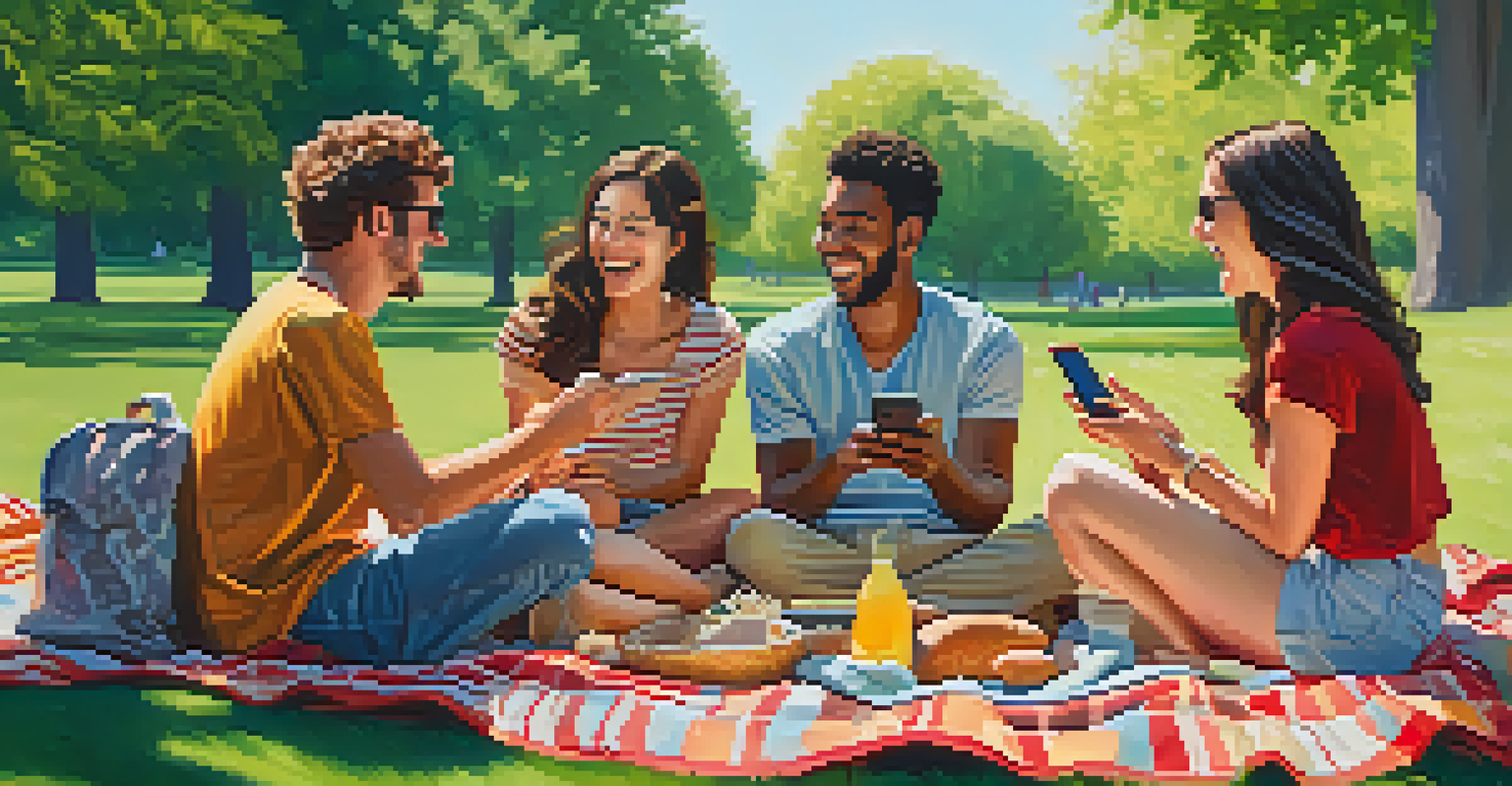Social Media and Loneliness: A Paradox

The Rise of Social Media: A Double-Edged Sword
Social media has revolutionized how we connect with others. While it offers unprecedented ways to communicate, it also raises questions about the quality of those connections. Many people find themselves feeling more isolated despite being constantly 'plugged in'. This paradox highlights a crucial aspect of our modern social landscape.
We are more connected than ever before, yet we feel more alone than ever.
Platforms like Facebook, Instagram, and Twitter allow us to share moments and stay in touch with friends and family. However, the nature of these interactions can often feel superficial, leaving users longing for deeper, more meaningful connections. As we scroll through curated posts, it’s easy to feel like everyone else is living their best life while we struggle with our own feelings of loneliness.
The challenge lies in balancing the convenience of online communication with the need for genuine interactions. While social media can foster connections, it can also create a false sense of community, making it harder to recognize when we truly need support from those around us.
The Illusion of Connection: Likes vs. Real Relationships
Social media interactions often boil down to likes and comments, which can feel gratifying but are far from fulfilling. When we receive a 'like' on a post, it provides a quick boost to our mood, but it doesn't replace the warmth of a face-to-face conversation. This can lead to a cycle where the quantity of online interactions overshadows the quality of our real-life relationships.

As we chase validation through social media, we might overlook the importance of nurturing our real-world connections. It’s like having a large audience at a concert but feeling alone on stage. The applause is nice, but it doesn’t substitute for the comfort of having a friend by your side.
Social Media Can Feel Isolating
Despite being connected online, many users experience feelings of loneliness and superficiality in their interactions.
Consequently, many find themselves feeling lonelier, even as their online networks grow. This highlights the need to seek balance, ensuring that we prioritize real-life relationships alongside our digital interactions.
The Role of FOMO in Digital Loneliness
Fear of missing out (FOMO) is a powerful feeling that many experience in the age of social media. Scrolling through posts of friends at events can evoke feelings of exclusion and loneliness, even when we are surrounded by others. FOMO feeds into the paradox of social media, where the more we see, the more we want to be part of it.
Social media is both a blessing and a curse. It allows for connection but can also lead to isolation if not used wisely.
This constant comparison can create a sense of inadequacy, making us feel like we’re not living up to the experiences of others. The more we engage with social media, the more we might feel disconnected from our own lives, as we yearn for the highlights we perceive in others’ posts.
In this way, FOMO can exacerbate feelings of loneliness, highlighting the need for mindful consumption of social media. By recognizing this pattern, we can take steps to mitigate its impact and focus on enjoying our own moments.
Social Media and Mental Health: A Complicated Relationship
Research has shown that excessive social media use can negatively impact mental health. Increased feelings of anxiety, depression, and loneliness are often linked to prolonged engagement with these platforms. This creates a cycle where users turn to social media to seek connection, only to end up feeling more isolated and anxious.
While social media can provide support networks for some, for others, it can serve as a trigger for negative emotions. The challenge lies in understanding how to use these platforms in a way that benefits our mental health rather than detracts from it. Recognizing the signs of unhealthy usage is crucial for fostering a healthier relationship with social media.
FOMO Amplifies Loneliness
The fear of missing out can lead to negative emotions and a sense of inadequacy, further disconnecting individuals from their own lives.
By seeking balance and being mindful of our habits, we can use social media as a tool for positive connection, rather than as a source of loneliness.
Building Authentic Connections Online
Despite the challenges posed by social media, there are ways to build authentic connections online. Engaging in meaningful conversations, joining interest-based groups, and participating in live chats can foster deeper relationships. The key is to focus on quality over quantity, seeking out those who resonate with our values and interests.
Additionally, taking time to disconnect from social media can help us recharge and refocus on our real-life relationships. When we prioritize authentic interactions, we can transform our online presence into a supportive community rather than a breeding ground for loneliness.
Creating boundaries around social media usage can also enhance our relationships. Setting aside dedicated time for friends and family can help us maintain a balance that nurtures our emotional well-being.
The Positive Side of Social Media: Community and Support
While social media can contribute to feelings of loneliness, it also has the potential to create supportive communities. Many individuals find solace in online groups centered around shared interests or experiences. These digital spaces provide a platform for individuals to connect with others who understand their struggles and triumphs.
For those who may feel isolated in their offline lives, online communities can offer the support they need. From mental health support groups to hobby-related forums, social media can serve as a lifeline for connection and understanding.
Authentic Connections Are Key
Building genuine relationships online requires intentional engagement and prioritizing quality interactions over quantity.
By leveraging these positive aspects of social media, users can combat loneliness and foster meaningful relationships in the digital realm. The challenge is to seek out these communities intentionally and engage in ways that are fulfilling.
Finding Balance: Navigating Social Media Mindfully
Navigating the complexities of social media and loneliness requires a mindful approach. Being aware of how it impacts our feelings and relationships is the first step towards creating a healthier balance. Taking breaks from social media or limiting screen time can help us reconnect with ourselves and the people around us.
Mindfulness practices, such as reflecting on our emotional responses to social media, can also be beneficial. When we understand how our interactions make us feel, we can make more intentional choices about how we engage with these platforms.

Ultimately, finding a balance between the digital and real worlds is crucial for our overall well-being. By being proactive in our social media habits, we can turn it into a tool for connection rather than a source of loneliness.